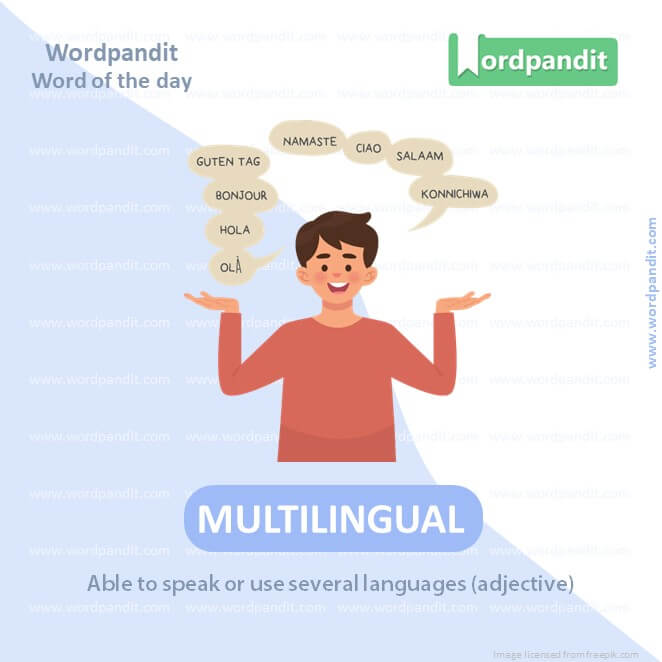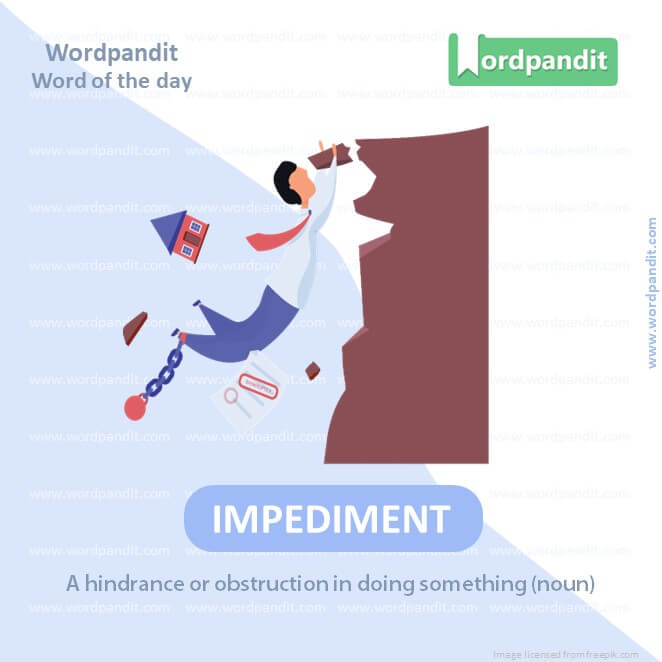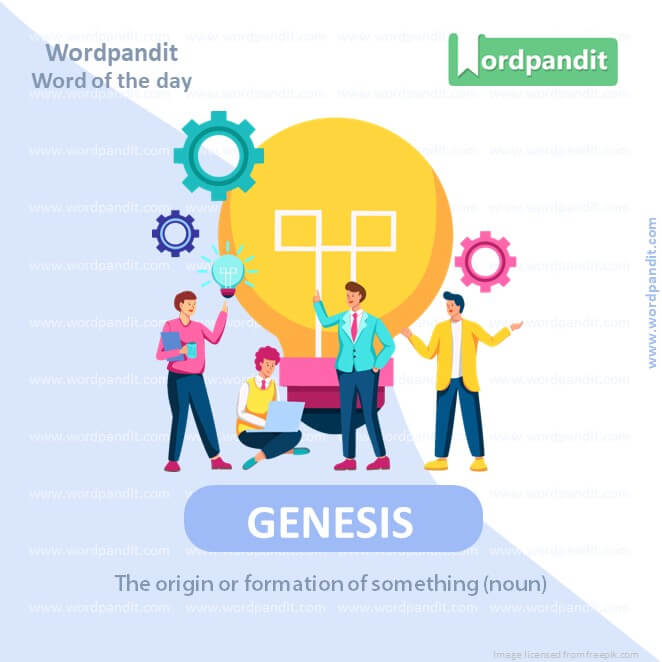Daily Vocabulary Words: List of Daily Used Words
Hi there. Welcome to this special section @ Wordpandit.
Our endeavour here is straightforward: highlighting important daily vocabulary words, you would encounter in The Hindu. This is your repository of commonly used words; essentially, we are posting a list of daily used words. Hence, this has significant practical application as it teaches you words that are commonly used in a leading publication such as The Hindu.
Visit the website daily to learn words from The Hindu.

WORD-1: MULTILINGUAL
CONTEXT: English as a common language in India has been acting as a thread by connecting multilingual Indians since the time of the British Raj. While communication in English is not much of a problem in the cities, the language becomes an impediment in the remote areas. This leads to the question why cannot all people in the world speak in the same language? It would be so much simpler and strengthen our power as a united human force.
SOURCE: The Hindu
EXPLANATORY PARAGRAPH: Imagine you can speak two languages, like English and Spanish. Cool, right? Well, when someone can speak many languages, we call them multilingual. It’s like having a superpower to talk to many people in their own language!
MEANING: Able to speak or use several languages (adjective).
PRONUNCIATION: mul-tee-LING-gwul
SYNONYMS: Polyglot, bilingual, plurilingual, multi-language, multilanguage, multi-tongued, cross-lingual
USAGE EXAMPLES:
1. Lisa is multilingual, so she easily communicates with people from different countries.
2. The software is multilingual, offering options in French, Spanish, and German.
3. Attending an international school made him multilingual by the age of ten.
4. Being multilingual is a great advantage in today’s global world.

WORD-2: IMPEDIMENT
CONTEXT: English as a common language in India has been acting as a thread by connecting multilingual Indians since the time of the British Raj. While communication in English is not much of a problem in the cities, the language becomes an impediment in the remote areas. This leads to the question why cannot all people in the world speak in the same language? It would be so much simpler and strengthen our power as a united human force.
SOURCE: The Hindu
EXPLANATORY PARAGRAPH: An impediment is like a big rock in the way when you’re trying to walk. It stops you or slows you down. So, if something is making it hard for you to do something, that thing is an impediment.
MEANING: A hindrance or obstruction in doing something (noun).
PRONUNCIATION: im-PED-uh-ment
SYNONYMS: Obstacle, barrier, hindrance, obstruction, hurdle, stumbling block, blockage
USAGE EXAMPLES:
1. The lack of funds was a major impediment to the project’s success.
2. His speech impediment made it difficult for him to pronounce certain words.
3. The mountain pass presented an impediment to the travelers.
4. Learning a new language without practice is full of impediments.

WORD-3: GENESIS
CONTEXT: Let us look at the Biblical story of the Tower of Babel. In Chapter 11 of the Book of Genesis, it is said that the descendants of Noah, after the aftermath of the great flood, spoke a common language. They migrated towards the east and finally settled down at a place called Shinar. They began building a city and a tower tall enough to reach heaven as a demonstration of their collective strength.
SOURCE: The Hindu
EXPLANATORY PARAGRAPH: The word genesis means the beginning or start of something. Like the story of how the world began is its genesis!
MEANING: The origin or formation of something (noun).
PRONUNCIATION: JEN-uh-sis
SYNONYMS: Origin, beginning, start, inception, birth, commencement, dawn
USAGE EXAMPLES:
1. The genesis of the idea came from their brainstorming session.
2. The movie explored the genesis of the superhero’s powers.
3. The book provides insight into the genesis of the universe.
4. Their friendship had its genesis in college.

WORD-4: DESCENDANTS
CONTEXT: Let us look at the Biblical story of the Tower of Babel. In Chapter 11 of the Book of Genesis, it is said that the descendants of Noah, after the aftermath of the great flood, spoke a common language. They migrated towards the east and finally settled down at a place called Shinar. They began building a city and a tower tall enough to reach heaven as a demonstration of their collective strength.
SOURCE: The Hindu
EXPLANATORY PARAGRAPH: Descendants are the people who come after someone, like your grandparents had your parents and your parents had you. So, you are a descendant of your grandparents!
MEANING: People who are related to a person or group and come after them in time (noun).
PRONUNCIATION: dih-SEN-duhnts
SYNONYMS: Offspring, successors, progeny, heirs, posterity, lineage, issue
USAGE EXAMPLES:
1. The descendants of the great king gathered for a reunion.
2. The ancient artifact was passed down through descendants for generations.
3. As descendants of pioneers, they were proud of their heritage.
4. The descendants of the original settlers still live in this town.

WORD-5: AFTERMATH
CONTEXT:Let us look at the Biblical story of the Tower of Babel. In Chapter 11 of the Book of Genesis, it is said that the descendants of Noah, after
the aftermath of the great flood, spoke a common language. They migrated towards the east and finally settled down at a place called Shinar. They began building a city and a tower tall enough to reach heaven as a demonstration of their collective strength.
SOURCE: The Hindu
EXPLANATORY PARAGRAPH: Aftermath is what happens after something big or important. For example, after a storm, the broken trees and flooded streets are the aftermath.
MEANING: The consequences or results following a significant event or action (noun).
PRONUNCIATION: AF-ter-math
SYNONYMS: Consequences, outcome, result, repercussion, fallout, sequel, after-effect
USAGE EXAMPLES:
1. The city was dealing with the aftermath of the hurricane.
2. The aftermath of the decision was felt by everyone in the company.
3. They worked together to rebuild in the aftermath of the earthquake.
4. The community came together in the aftermath of the tragedy.
Certainly! Below are the formatted explanations for the words you provided:
WORD-6: BLUNDER
CONTEXT: Yahweh, the god of the Hebrew Bible, became alarmed and annoyed on observing this, and broke them into many groups, each speaking a different language to reduce the power of their collective strength. This created confusion in terms of communication and understanding and the project failed. Some people are of the opinion that the British made a blunder teaching English to Indians which helped them to unite, communicate and become powerful enough to end colonialism. Irrespective of whether the story is true or not, the writer of this narrative knew the power of a common language. Language is a vehicle to transfer information, ideas and emotions.
SOURCE: The Hindu
EXPLANATORY PARAGRAPH: A blunder is like when you accidentally spill your juice or trip over a toy. It means making a big mistake without intending to.
MEANING: A careless or stupid mistake. (noun)
PRONUNCIATION: BLUN-der
SYNONYMS: Mistake, error, oversight, slip, gaffe, goof, faux pas
USAGE EXAMPLES:
1. The player’s blunder cost the team the game.
2. It was a major blunder to forget the passports at home.
3. He made a social blunder by calling her by the wrong name.
4. Realizing her blunder, she quickly apologized.
WORD-7: COLONIALISM
CONTEXT: Yahweh, the god of the Hebrew Bible, became alarmed and annoyed on observing this, and broke them into many groups, each speaking a different language to reduce the power of their collective strength. This created confusion in terms of communication and understanding and the project failed. Some people are of the opinion that the British made a blunder teaching English to Indians which helped them to unite, communicate and become powerful enough to end colonialism. Irrespective of whether the story is true or not, the writer of this narrative knew the power of a common language. Language is a vehicle to transfer information, ideas and emotions.
SOURCE: The Hindu
EXPLANATORY PARAGRAPH: Imagine a big kid taking over a smaller kid’s sandbox and telling them what to do. That’s kind of what colonialism is. It’s when one country takes control of another place and its people.
MEANING: The practice of one country controlling and ruling over another territory, often exploiting its resources. (noun)
PRONUNCIATION: kuh-LOH-nee-al-izm
SYNONYMS: Imperialism, domination, occupation, annexation, subjugation, conquest
USAGE EXAMPLES:
1. The history of the continent was shaped by colonialism.
2. The museum had an exhibit on the effects of colonialism.
3. Critics argue that colonialism left lasting negative impacts on many nations.
4. The nation fought to free itself from the shackles of colonialism.
WORD-8: EGALITARIANISM
CONTEXT: India’s big moment as host of the G-20 Summit will arrive this weekend, as world leaders gather in New Delhi for the main event marking the year of its presidency. The group is seen as a more egalitarian version of the G-7 as it includes the leadership of the developing world and is now the “pre-eminent forum for global economic cooperation”. At the start of its presidency last December, it was clear that India would be hamstrung by several events.
SOURCE: The Hindu
EXPLANATORY PARAGRAPH: Egalitarianism is a big word that means everyone should be treated the same, no matter who they are. It’s like saying all kids should get the same amount of ice cream, so it’s fair.
MEANING: The belief that all people are equal and deserve the same rights and opportunities. (noun)
PRONUNCIATION: ee-guh-lih-TAIR-ee-an-izm
SYNONYMS: Equality, fairness, equitability, even-handedness, impartiality, non-discrimination
USAGE EXAMPLES:
1. The movement emphasized the importance of egalitarianism in society.
2. Her views on egalitarianism influenced her political decisions.
3. They fought for egalitarianism in the workplace.
4. Egalitarianism remains a key principle in democratic societies.
WORD-9: PRE-EMINENT
CONTEXT: India’s big moment as host of the G-20 Summit will arrive this weekend, as world leaders gather in New Delhi for the main event marking the year of its presidency. The group is seen as a more egalitarian version of the G-7 as it includes the leadership of the developing world and is now the “pre-eminent forum for global economic cooperation”. At the start of its presidency last December, it was clear that India would be hamstrung by several events.
SOURCE: The Hindu
EXPLANATORY PARAGRAPH: Pre-eminent is like being the best at something or being very important. Like if you have the tallest tower of blocks, yours is pre-eminent among all the towers.
MEANING: Surpassing all others in importance or quality. (adjective)
PRONUNCIATION: pree-EM-uh-nent
SYNONYMS: Foremost, leading, dominant, top, superior, outstanding, premier
USAGE EXAMPLES:
1. She is the pre-eminent expert in her field.
2. The institute remains pre-eminent in scientific research.
3. The author’s work is pre-eminent in classic literature.
4. Their company is the pre-eminent supplier of electronics.
WORD-10: HAMSTRUNG
CONTEXT: India’s big moment as host of the G-20 Summit will arrive this weekend, as world leaders gather in New Delhi for the main event marking the year of its presidency. The group is seen as a more egalitarian version of the G-7 as it includes the leadership of the developing world and is now the “pre-eminent forum for global economic cooperation”. At the start of its presidency last December, it was clear that India would be hamstrung by several events.
SOURCE: The Hindu
EXPLANATORY PARAGRAPH: Hamstrung is like when you want to run but your shoe laces are tied together. It means you’re held back or stopped from doing something.
MEANING: To restrict or hold back the efficiency or progress of someone or something. (verb)
PRONUNCIATION: HAM-strung
SYNONYMS: Cripple, hinder, impede, obstruct, restrain, inhibit, handicap
USAGE EXAMPLES:
1. The team was hamstrung by a lack of funding.
2. His progress was hamstrung by outdated tools.
3. They felt hamstrung by the new regulations.
4. The project was hamstrung from the start due to poor planning.
Vocabulary English Grammar
Understanding ‘vocabulary English grammar’ is a critical cornerstone in mastering the English language. It involves learning new words and their grammatical usage, thereby strengthening both vocabulary and the grasp over English grammar rules. Through a guided approach, attaining proficiency in ‘vocabulary English grammar’ becomes a less daunting task.
The heart of ‘vocabulary English grammar’ is learning new words while simultaneously understanding their usage in the sentence structure. Start by learning words, their meanings, and their part of speech (noun, adjective, verb, etc.) as this will help you use them correctly within a sentence, aligning with grammar rules.
Another effective way to master ‘vocabulary English grammar’ is through regular reading. By engaging with diverse reading materials, you encounter new words in their natural grammatical habitat. This exposes you to both new words and their grammatical function, contributing to your ‘vocabulary English grammar’ knowledge.
Writing exercises make the ‘vocabulary English grammar’ learning more tangible. Practicing constructing sentences with new words while following grammar rules, whether in essays or daily journal entries, reinforces your understanding and memory of both elements.
Technological resources like language learning apps, websites, and online courses can considerably enhance ‘vocabulary English grammar’ learning. These platforms often provide word lists with their grammatical context and even organized exercises designed to strengthen both vocabulary and grammar together.
Finally, practice and patience are essential when it comes to ‘vocabulary English grammar’. Regular revisions, constant use of new words in grammatically correct sentences, and persistence despite occasional mistakes lead to progressive improvement.
In essence, mastering ‘vocabulary English grammar’ is a steady journey that requires integrated learning of vocabulary and grammar. By using the right resources, practicing consistently, and showing resilience, ‘vocabulary English grammar’ can be learned effectively, leading to solid English language proficiency.













